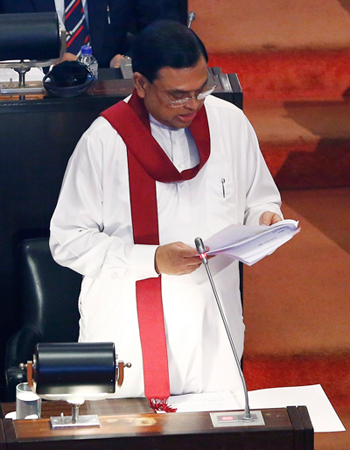Basil’s production- oriented budget targets taxes
Finance Minister Basil Rajapaksa presented his maiden budget on Friday focusing on a production-oriented economy with spending cuts for government officials in telephone bills, travelling allowances, promoting investment in neglected sectors and compensating those affected by the pandemic.

Finance Minister Basil Rajapaksa presenting the budget
But analysts were not swayed saying the budget was tilted towards raising taxes which have impacted the usual items – cigarettes and alcohol – while revenue was coming through a raft of taxes through a surcharge tax, VAT, GST, motor vehicles and license fees.
Revenue and grants in the 2022 budget would be Rs.2.284 trillion while expenditure has been set at Rs. 4 trillion.
One of the taxes was a one-time tax surcharge of 25 percent to be imposed on persons or companies with taxable income over Rs. 2,000 million which would result in revenue of Rs. 100 billion for the assessment year 2020/21.
This tax surcharge is a huge blow on the exporters, FTZ Association General Secretary Dhammika Fernando told the Business Times. He noted that taxing one fourth the revenues (2021) at a time when people are finding it difficult to make ends meet will not augur well with the exporters.
“There are no progressive measures spelt out by the Finance Minister in encouraging exporters or investors except for backward integration which is a good thing,” he said. The 3 per cent increment on VAT on banks and financial institutions would mean the cost of financing will go up for exporters especially on trade financing.
However, imposing targets without providing the right environment is not a fruitful way of doing things and that will not help to achieve the goals, he pointed out.
The aim of the budget is to collect revenue from the taxes imposed, an analyst said. A stockbroker said that the banking sector will get hit with the additional 25 per cent surcharge. Apart from this sector there is no means or impact on the stock market.
Another revenue earner was the proposal to impose a fee on vehicles meeting with accidents with insurance companies paying this fee aimed at reducing the number of motor vehicle accidents.
Hayleys Plantations Managing Director Dr. Roshan Rajadurai said that the allocations (for plantations) have been proposals that have been carried out over the years.
He noted that providing assistance for the organic farming is a good move that would benefit the farmers but alongside that others adopting other methods of farming using chemical fertilisers should also be allowed to operate.
With government plans to stop import of herbicides and promote use of alternatives is good but it must be understood that weedicides are not toxic and over the last 20 years these have been used and it had not been proven to be toxic since they were able to market them with no issues, he explained.
Following a practice in recent years, all the tax proposals were not announced by the minister but are contained in the annexures to the budget speech which was uploaded to the Ministry of Finance website. https://www.treasury.gov.lk/web/budget-speeches/section/2022
Minister Rajapaksa said Rs. 8.5 billion earned by bond scam culprit Perpetual Treasuries in violation of Central Bank rules will be transferred to the Treasury.
The government has set an export revenue target of US$12 billion for 2021 while expenditure on imports is set at $16.6 billion. Foreign remittances are expected to reach $6.8 billion in 2021 with hopes to increase it to $8 billion in the next few years.
The minister announced various incentives for export-led industries, suspended the construction of new state buildings for two years and proposed a contributory pension scheme for senior citizens who do not currently receive pensions. The Finance Ministry has taken measures to recover Rs. 500 billion the country had to forego due to import restrictions so far this year by increasing VAT and some other taxes, heads of some private sector associations said.
President of the National Trade Protection Council Mahendra Perera said that the budget 2021 has focused attention on the COVID-19 affected micro small and medium scale industries by allocating Rs.5000 million.
This proposal is welcomed by the SME sector he said adding that modalities of distributing this money among affected industries is to be clarified and it should be in a transparent manner.
Former Chairman of Ceylon Motor Traders Association Gihan Pilpitiya noted that issues of motor traders have not been addressed in the budget.


